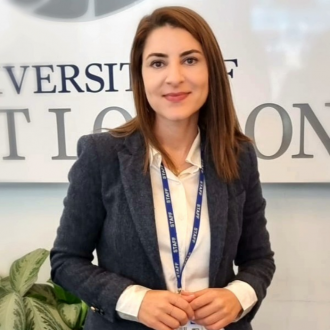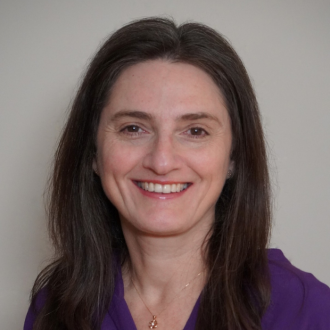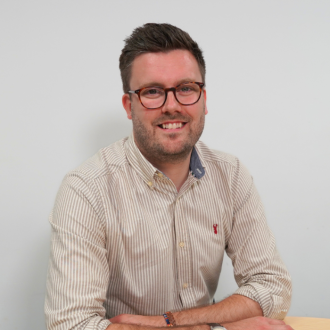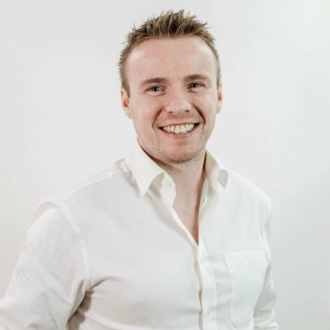- Postgraduate
Psychology Conversion MSc
Overview
Would you like to fast-track your route to Chartered Psychologist status? This psychology conversion course is designed to make you eligible for the Graduate Basis for Chartered Membership (GBC) of the British Psychological Society (BPS) on graduation. Gaining GBC will be your first step to chartered status.
Your course will focus on enhancing your critical thinking and research skills, preparing you for your dissertation and future career.
You will learn from active research staff with specialisms in areas that include applied gender psychology, the effects of ageing on decision-making and personality.
Our psychology research facilities include state-of-the-art brain imaging electroencephalogram (EEG), eye tracking equipment and a range of experiment and research software.
If you have any questions about the relevance of your qualifications or experience please contact the course leader, Dr Linda Dinc.
This course is being reapproved to refresh and enhance the study content, the course structure and modules are subject to change.

Select your desired study option, then pick a start date to see relevant course information:
Start date:
If your desired start date is not available, try selecting a different study option.
Why study Psychology Conversion with us?


What our students say…
I would thoroughly recommend this course, owing to the transparency and engagement from the staff, the breadth of content covered, and the pragmatically oriented approach to teaching to fit around the students' lives. The library services were very good, and offered an abundance of comfortable and silent work space, with plenty of IT equipment.




Course detail & modules
This course is accredited by the BPS and will cover the core content you need to apply for GBC membership as a successful graduate.
As this is a Masters-level psychology conversion course, you will also develop your critical thinking and the skills and knowledge to plan, implement and report psychological research, using a range of statistical as well as qualitative research techniques.
Small tutor-led sessions will support your academic skills development, including the ability to use referencing and writing styles correctly. We will also support your personal development in the key areas of time management and project planning. During the course, your skills and knowledge will be assessed through:
- research reports
- oral and poster presentations
- written examinations
- essays
You will be aided by experienced teaching staff who are active in research. Their expertise will open up opportunities for you to choose an area of specialism and complete your dissertation on a topic of interest. You will also develop your understanding of relevant research methodologies.
The MSc Psychology Conversion degree will also help you to gain a wide range of transferable skills in:
- analysis
- communication
- statistics
- IT
- independence and team working
These skills will make you an attractive graduate to employers in a range of industries.
Course subject to approval
Compulsory modules
-
Psychology Research Methods
In this module, you will cover the research methods fundamental to understanding both published research and the conduct of research in psychology. You will look at qualitative and quantitative research from conception, through design, data collection, and analysis and write up. Psychology uses a wide range of statistical methods and you will be taught these from the basics through to more advanced inferential tests. You will also be introduced to the content – and the importance of – the BPS Code of Human Research Ethics.
-
Development Across the Lifespan
On this module you will examine key concepts, theories, methods and findings in the field of developmental psychology. You will take a lifespan perspective, focusing on human development from early childhood through to adolescence, adulthood and old-age.
-
Social and Cross-cultural Psychology
In this module you will focus on the psychological study of the individual as part of society as well as on the influence of society on its individual members. You will gain an overview of the main topic areas researched by social psychologists, including social identity, social cognition and representations; social influence, conformity and obedience, attitude and attitude change, stereotyping, prejudice and discrimination, pro-and anti-social behaviour. You will also look at the applications of social psychology, ethical implications and research methods.
-
Cognition and Neuropsychology
This module reflects the requirements of the British Psychological Society for accreditation. You will deal with four major issues: attention/perception, memory, language and thought/reasoning. Throughout the module reference will be made to examples from cognitive neuropsychology and how this informs us about normal cognitive functioning.
-
Personality and Intelligence in Psychology
On this module you will examine the key concepts, theories, methods and findings in the psychology of personality and intelligence. This includes personality, psychometrics, intelligence, cognitive style, emotion, motivation, mood, positive psychology, physical and mental health (including social, biological and cognitive processes), and diversity.
-
Applied Biological Psychology
This module will introduce you to the study of the brain and the mind, and their interaction with behaviour and the environment. It will examine concepts, theories, methods and findings, as well as more practical, applied aspects of biological psychology.
-
MSc Psychology Conversion Dissertation
This module further develops the skills and knowledge required for independent research, assessing you on qualitative research skills as well as multivariate statistical analysis. You will complete your own empirical project under the one-to-one supervision of one of our research-active Psychology staff, as well as attending regular group sessions.
Entry requirements
You should have:
- an honours degree (2:2 or above) from a UK university or equivalent
- Maths and English GCSE or Level 2 equivalent
We look for students who show enthusiasm and a passion for the subject through previous study or professional experience.
If you have any questions about the relevance of your qualifications or experience please contact the course leader shown in the teaching staff.
You need to meet our English language requirement - a minimum of IELTS 6.5 for each of the 4 individual components (Reading, Writing, Speaking and Listening). Visit our English language requirements page for information on other English language tests we accept.
You also need academic qualifications at the same level as UK applicants. In some countries where teaching is in English, we may accept local qualifications. Check for local equivalents.
We offer pre-sessional English language courses if you do not meet these requirements. Find out more about our English Language courses.
We look for students who show enthusiasm and a passion for the subject through previous study or professional experience.
If you have any questions about the relevance of your qualifications or experience please contact the course leader shown in the teaching staff.
Fees & funding
Please note:
- Fees for the 2026/27 academic year and onwards may be subject to Government regulation and change.
- Tuition fees are charged for each year of your course. If your course runs for two years or more, you will need to pay the fee for each academic year at the start of that year.
- If your course runs for less than two years, the cost above is for your full course and you will need to pay the full fee upfront.
- If no fee is shown above then the fees for this course are not available yet. Please check again later for updates.
Funding your studies
If you are studying a Masters course you may be eligible to apply for a Postgraduate Loan, this may help contribute towards your course fees and living costs.
Additional funding is available to some types of students, such as disabled students or those with dependants.
We offer a range of scholarships and bursaries, including awards for specific subjects.
Awards for human and social science students are also on offer.
View full details, including conditions and eligibility.
Please note:
- Fees for the 2026/27 academic year and onwards may be subject to Government regulation and change.
- Tuition fees are charged for each year of your course. If your course runs for two years or more, you will need to pay the fee for each academic year at the start of that year.
- If your course runs for less than two years, the cost above is for your full course and you will need to pay the full fee upfront.
- If no fee is shown above then the fees for this course are not available yet. Please check again later for updates.
International students - funding your studies
We offer scholarships for international students including International Ambassador Scholarships.
Further information about funding and financial support for international students is available from the UK Council for International Student Affairs.
Teaching staff

Dr Linda Dinc
I am a chartered psychologist. I received my MSc in Neuroscience from King’s College London, Institute of Psychiatry and my PhD from Goldsmith’s University of London.
My research focuses on addiction. I am particularly interested in the contribution of personality traits, mood and cognitive factors to development and maintenance of addiction. In addition to my work in addiction, I have developed an interest in the applications of psychology to education after joining UWL.
I aim to explore the psychological factors that affect education staff and student performance and wellbeing. I have had the opportunity to work with practitioners and schools on research and knowledge exchange projects. I was awarded the Knowledge Exchange Fund in 2022 to develop and pilot a Continuing Professional Development (CPD) training for teachers in emotion regulation to improve emotional awareness and wellbeing of education staff. I am currently working on another Knowledge Exchange project to develop a short course for schools in identifying and dealing with online risk behaviours in classroom.
In addition to my role as a senior lecturer, I am the course leader for the MSc Psychology of Mental Health (Conversion) course and I support the quality team in my role as the Recognition of Prior Learning assessor. I am also a senior fellow of the Higher Education Academy. Find out more about the MSc Psychology of Mental Health (Conversion).
I am a chartered psychologist. I received my MSc in Neuroscience from King’s College London, Institute of Psychiatry and my PhD from Goldsmith’s University of London.
My research focuses on addiction. I am particularly interested in the contribution of personality traits, mood and cognitive factors to development and maintenance of addiction. In addition to my work in addiction, I have developed an interest in the applications of psychology to education after joining UWL.
I aim to explore the psychological factors that affect education staff and student performance and wellbeing. I have had the opportunity to work with practitioners and schools on research and knowledge exchange projects. I was awarded the Knowledge Exchange Fund in 2022 to develop and pilot a Continuing Professional Development (CPD) training for teachers in emotion regulation to improve emotional awareness and wellbeing of education staff. I am currently working on another Knowledge Exchange project to develop a short course for schools in identifying and dealing with online risk behaviours in classroom.
In addition to my role as a senior lecturer, I am the course leader for the MSc Psychology of Mental Health (Conversion) course and I support the quality team in my role as the Recognition of Prior Learning assessor. I am also a senior fellow of the Higher Education Academy. Find out more about the MSc Psychology of Mental Health (Conversion).
Study & career progression

Graduates from this Masters in Psychology Conversion course usually move into one of the following:
- employment as a research or psychology assistant
- PhD study
- DClin Psychology or DEd Psychology training
- human resource management
- social sciences
- counselling (with further training)
- education (with further training)
If you would like to take your studies further at UWL, you can find out more about MPhil and PhD courses with the specialised Graduate School.
How to apply

You can apply online at any time by following the link below.
Our application form will ask you for some information about:
- what you want to study
- your previous qualifications or experience
- your references
- how we can contact you.
Want to ask us a question first? We would love to hear from you. Contact us free on:
- 0800 036 8888
- courses@uwl.ac.uk
Apply for this course
Next steps after making your application
We aim to make a decision on your application as quickly as we can. If we need any more information about your qualifications, we will be in touch.
In the meantime, come and visit us and find out more about what studying at UWL is like. Sign up for an open day or join a campus tour.
Visit us and see for yourself
Talk to our tutors and find out about our courses and facilities at our next open day or join a campus tour.
We're here to help
Any questions about a course or studying at UWL? We're here to help - call us on 0800 036 8888 (option 2, Monday – Friday 10am-4pm) or email us on courses@uwl.ac.uk.
Our postgraduate prospectus
All of our courses in one place - download now or order a hard copy.

You can apply online at any time by following the link below.
Our application form will ask you for some information about:
- what you want to study
- your previous qualifications or experience
- your references
- how we can contact you.
Want to ask us a question first? We would love to hear from you. Contact us free on:
- 0800 036 8888
- courses@uwl.ac.uk
Apply for this course
Next steps after making your application
We aim to make a decision on your application as quickly as we can. If we need any more information about your qualifications, we will be in touch.
In the meantime, come and visit us and find out more about what studying at UWL is like. Sign up for an open day or join a campus tour.
Visit us and see for yourself
Talk to our tutors and find out about our courses and facilities at our next open day or join a campus tour.
We're here to help
Any questions about a course or studying at UWL? We're here to help - call us on 0800 036 8888 (option 2, Monday – Friday 10am-4pm) or email us on courses@uwl.ac.uk.
Our postgraduate prospectus
All of our courses in one place - download now or order a hard copy.

You can apply online at any time by following the link below.
Our application form will ask you for some information about:
- what you want to study
- your previous qualifications or experience
- your references
- your visa (if required)
- how we can contact you.
Want to ask us a question first? Our dedicated international students’ team would love to hear from you.
- email international@uwl.ac.uk to submit a question
Apply for this course
Next steps after making your application
We aim to make a decision on your application as quickly as we can. If we need any more information about your qualifications, we will be in touch.
In the meantime, come and visit us and find out more about what studying at UWL is like. Sign up for an open day or join a campus tour.
Visit us and see for yourself
Talk to our tutors and find out about our courses and facilities at our next open day or join a campus tour.
We're here to help
Any questions about a course or studying at UWL? We're here to help - call us on 0800 036 8888 (option 2, Monday – Friday 10am-4pm) or email us on courses@uwl.ac.uk.
Our postgraduate prospectus
All of our courses in one place - download now or order a hard copy.
Search for courses
Hear from our Alumni

Viktorija shares her career highlights from working at HMP Wandsworth to her role as a witness and case review officer for the British Transport Police.
Student life at UWL
Important notes for applicants
Disclaimer
*Modern universities - defined as higher education institutions that were granted university status in, and subsequent to, 1992.
**The National Student Survey 2023 and 2024 - Average of answers to all questions by registered student population. Excludes specialist institutions.
Testimonials - our students or former students provided all of our testimonials - often a student from the course but sometimes another student. For example, the testimonial often comes from another UWL student when the course is new.
Optional modules - where optional modules are offered they will run subject to staff availability and viable student numbers opting to take the module.
Videos - all videos on our course pages were accurate at the time of filming. In some cases a new Course Leader has joined the University since the video was filmed.
Availability of placements - if you choose a course with placement/internship route we would like to advise you that if a placement/internship opportunity does not arise when you are expected to undertake the placement then the University will automatically transfer you to the non-internship route, this is to ensure you are still successful in being awarded a degree.














